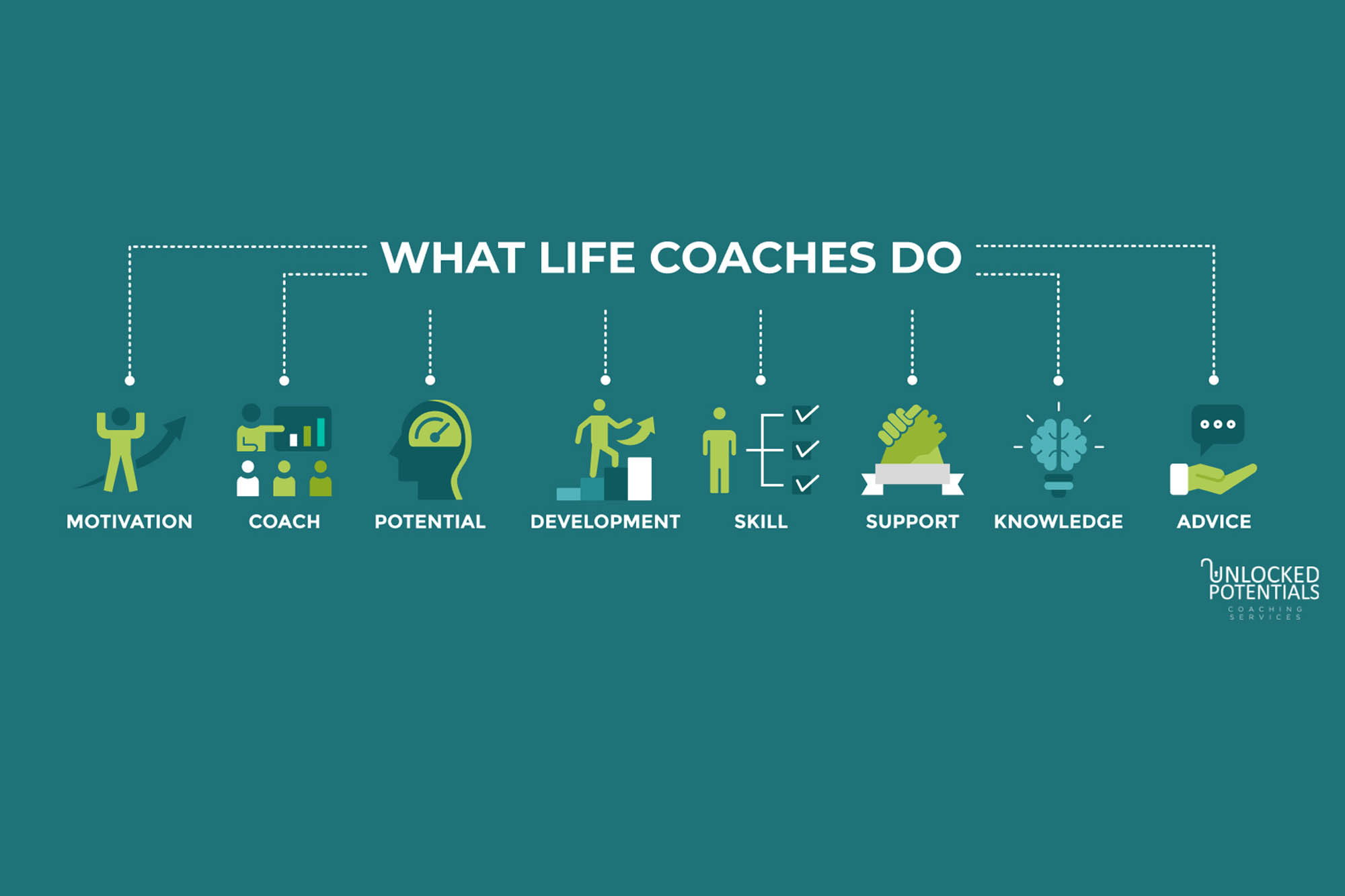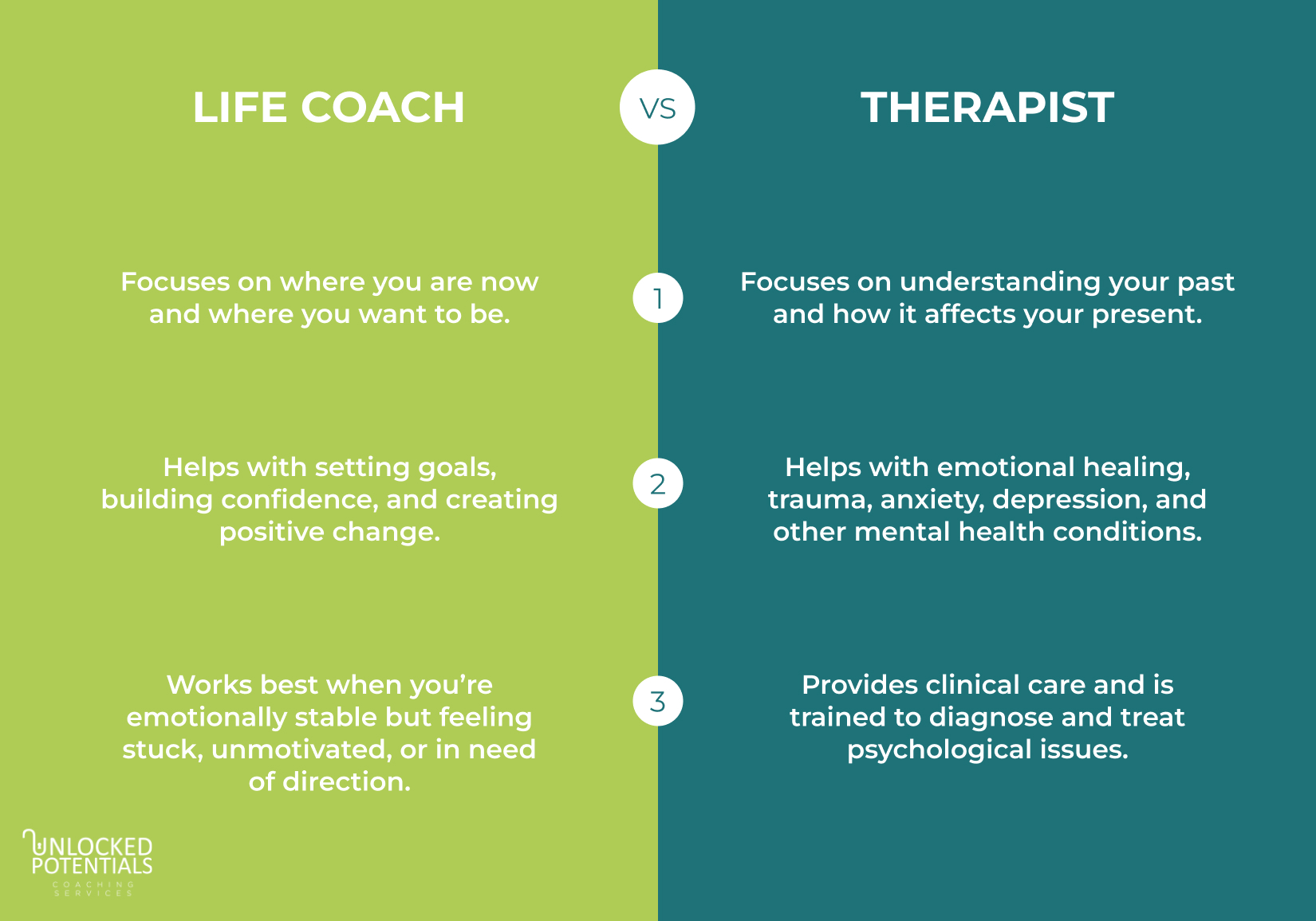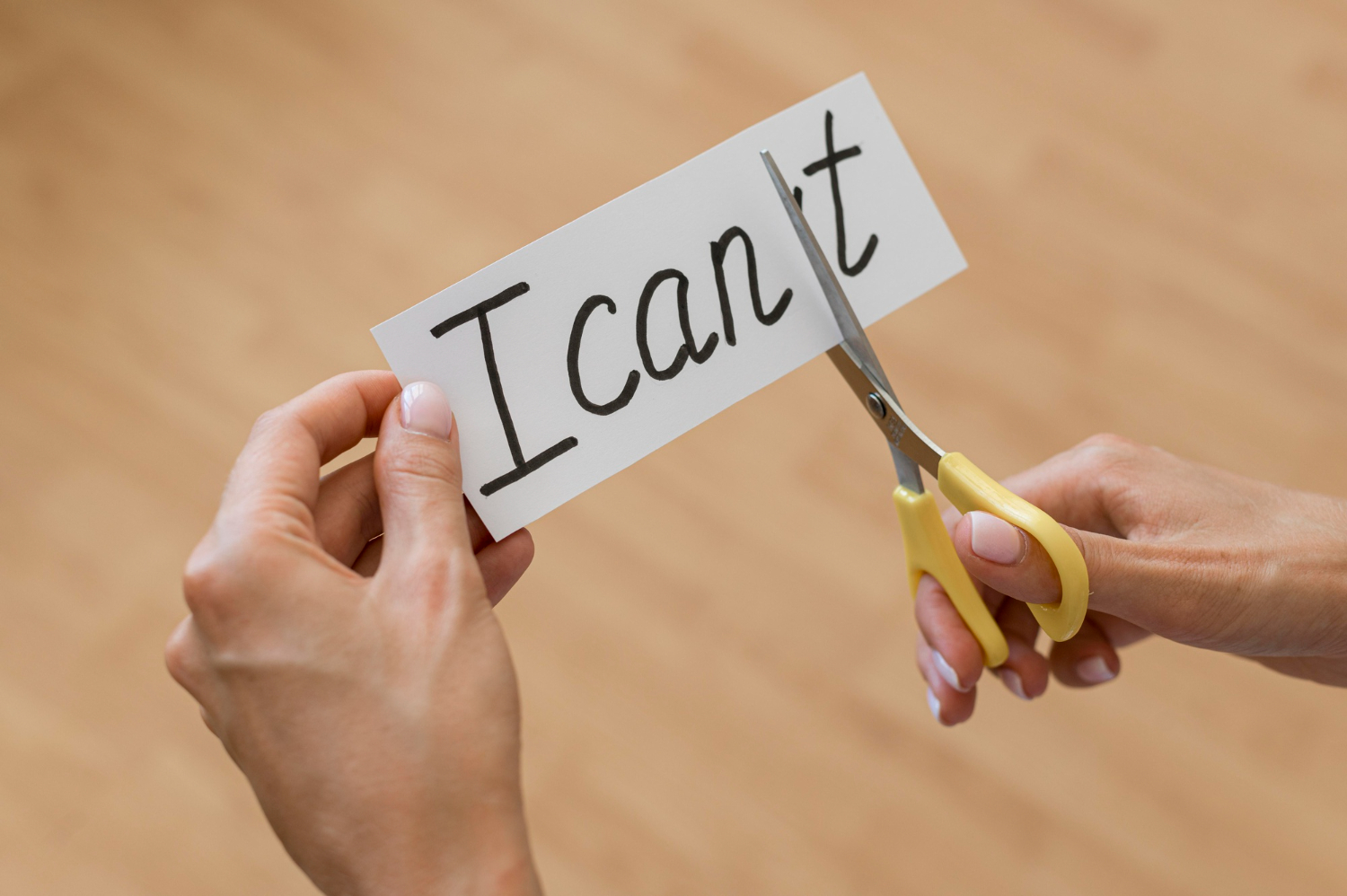What Is a Life Coach and What Do They Do

Life moves quickly. One day, you’re full of ideas and plans, and the next, you’re wondering how things became so overwhelming. I’ve spoken to so many clients who tell me, “I know I want more, but I don’t know where to start.” It’s not that they aren’t capable—it’s that sometimes, we all need a bit of guidance to see the bigger picture or to find the confidence to move forward.
Life coaching wasn’t always something people talked about. But now? It’s everywhere, and for good reason. More professionals, creatives, and everyday people are seeing coaching as a powerful tool. It’s about having someone in your corner, helping you clear the fog and focus on what truly matters to you. And that’s something we could all use.
What Is a Life Coach?
A life coach helps you get from where you are now to where you want to be. We guide you to set clear goals, overcome what’s holding you back, and build a plan to move forward. Simply put, a life coach is someone who helps you unlock your potential and stay on track.
But to be clear, a life coach isn’t there to tell you how to live your life. You already have the answers within you, even if they feel buried right now. What a coach does is walk beside you and keep you focused when you’re facing burnout.
Core Principles of Life Coaching
At the heart of life coaching is a simple belief: You are capable of more than you realise. A good coach doesn’t fix you, instead, they help you see your own strengths and use them to create the life you want.
Let’s break down a few key principles that guide this process.
-
Goal-setting and accountability
It’s easy to say, “I want things to change.” But without clear goals, it remains just a wish. A life coach helps you turn that wish into something real and achievable. Together, you’ll define what success looks like for you, not what others expect, but what truly matters to you.
We all have days when motivation dips or doubts creep in. A life coach is there to remind you of your “why” and gently push you to keep going, even when it’s tough. It’s like having someone in your corner who truly cares about seeing you win.
-
Empowerment over advice-giving
A life coach will not simply tell you what to do; it’s not just about giving advice or quick fixes. It’s about helping you make decisions that feel right for your life.
A good life coach knows that lasting change comes when you feel confident in your own choices. So instead of handing you a checklist, we’ll encourage you to explore, reflect, and trust yourself more.
-
Focus on the present and future, rather than dwelling on past trauma
We don’t dig into past wounds or diagnose mental health conditions—that’s the job of a trained therapist. Instead, life coaching is looking at where you are today and where you’d like to be tomorrow.
It’s future-focused. It’s about asking, “What’s next?” and “How can we get there together?” If you’re feeling stuck, that forward-looking mindset can be exactly what you need to regain momentum and start seeing possibilities again.
What Does a Life Coach Do?
As a life coach, our role is to support your personal growth, not by giving you all the answers, but by helping you discover them for yourself.
Life coaching is a partnership built on trust, encouragement, and understanding. It’s about having someone by your side who sees your potential, even when you’re struggling to see it yourself.
Roles and Responsibilities
At its core, a life coach’s responsibility is to help you move from feeling stuck to making progress with confidence and purpose. We offer a safe, judgment-free space where you can openly explore your thoughts, ambitions, and challenges.
Here’s what a life coach typically does:
-
Clarifies Your Goals: Define clear, achievable goals that align with your values and vision.
-
Identifies Obstacles: Recognise what’s holding you back—and how to overcome it.
-
Creates Action Plans: Breaks things down into manageable steps, so you always know what to focus on next.
-
Keeps You Accountable: When motivation fades (and it does for everyone), a life coach reminds you of your “why” and keeps you on track without judgement.
-
Encourages Self-Discovery: Instead of telling you what to do, a life coach asks the right questions to help you find the answers that fit your life.
-
Supports Your Confidence and Mindset: Build resilience, confidence, and a positive outlook as you grow.
Common Areas Life Coaches Can Support
Life coaches work with people from all walks of life, offering support wherever clarity, direction, or motivation is needed. You don’t need to be facing a crisis to benefit—sometimes, it’s simply about wanting more from life.
Here are some of the most common areas where life coaches provide support:
-
Career Growth and Transitions
-
Personal Development
-
Confidence and Motivation
-
Stress and Resilience
-
Relationships and Communication
-
Decision-Making and Clarity
Types of Life Coaches
Not all life coaches do the same thing. Some focus on helping with general life goals, while others specialise in specific areas like careers, wellness, or relationships. The type of life coach you choose depends on what kind of support you’re looking for.
Generalist vs Specialist Coaches
A generalist life coach helps with a wide range of personal and professional goals. They’re a good choice if you’re looking for overall guidance, especially when you know you want change but aren’t sure where to start.
A specialist life coach, on the other hand, focuses on a specific field. If you already know exactly what challenge or goal you want to work on—like improving your career, managing stress, or building better relationships—a specialist coach can offer deeper expertise in that area.
Neither option is better than the other. It’s about what feels right for you. If life feels messy and you need help sorting it all out, a generalist might be the ideal choice. If you have a clear focus, a specialist could give you that extra edge.
Popular Life Coaching Niches
Life coaching has grown so much because people need different kinds of support at different times. That’s why many coaches choose to specialise in areas where they know they can make the biggest difference.
Here are some of the most common life coaching niches:
-
Career Coaching: For those navigating job changes, leadership roles, or looking to find more purpose in their work.
-
Wellness and Health Coaching: Focused on improving physical health, emotional wellbeing, stress management, and creating healthier lifestyles.
-
Relationship Coaching: Helping individuals or couples improve communication, build stronger connections, or navigate relationship challenges.
-
Business and Executive Coaching: Designed for entrepreneurs, freelancers, or corporate leaders who need support with growth, leadership skills, and decision-making.
-
Confidence and Mindset Coaching: For anyone struggling with self-doubt, low confidence, or limiting beliefs that are holding them back.
-
Financial Coaching: Guiding clients to develop better money management habits, plan for the future, and reduce financial stress.
-
Spiritual or Purpose Coaching: Helping people connect with their values, beliefs, and sense of purpose in life.
No matter the niche, every life coach shares the same goal: to help you become the best version of yourself.
The Difference Between a Life Coach and a Therapist
A life coach helps you focus on your present and future goals, while a therapist helps you heal from past emotional or mental health challenges. Coaching is about personal growth and moving forward; therapy is about understanding and treating deeper emotional issues.
It’s common for people to wonder whether they need a coach or a therapist, especially when life feels uncertain. The key difference is that coaching assumes you’re ready to take action and build towards your future. At the same time, therapy focuses on helping you process past pain or manage mental health conditions before moving ahead.
Here’s a simple way to see how they differ:
If you’re feeling overwhelmed by unresolved emotional pain or struggling with things like anxiety, depression, or trauma, a therapist is the right choice. There’s real strength in seeking that kind of help when it’s needed.
If you’re in a place where you’re ready to grow, but you’re unsure how to move forward—whether in your career, relationships, or personal life—a life coach can guide you with structure, encouragement, and accountability.
5 Benefits of Working With a Life Coach
Many people think they have to face challenges alone, but real growth often happens when you allow someone to walk beside you. Here’s how life coaching can make a meaningful difference in your life.
1. Improved Self-Confidence and Clarity
A life coach helps you see what you’re truly capable of, even when you’re second-guessing yourself. When your mind feels cluttered and you’re unsure of your next step, a coach brings clarity, helping you focus on what matters most.
2. Better Stress Management and Resilience
Life doesn’t slow down when you’re feeling overwhelmed, but a coach can help you manage the pressure. With the right tools and support, you’ll bounce back quicker and feel more in control.
3. Stronger Relationships and Communication Skills
Good relationships—whether personal or professional—start with understanding yourself. A life coach helps you improve your communication, set boundaries, and connect with others in a more meaningful way.
4. Enhanced Career Satisfaction and Personal Fulfilment
If you feel stuck in your career or unsure if you’re on the right path, a coach can help you find direction and satisfaction in your work. It’s not just about promotions or pay rises—it’s about feeling fulfilled by what you do. When your career aligns with your values, success feels a lot more rewarding.
5. A Sense of Purpose and Direction
One of the biggest reasons people seek life coaching is that they’re searching for something more. A life coach helps you build self-awareness, so you can uncover what truly gives your life meaning.
What to Expect in a Life Coaching Session
A life coaching session helps you get clear on your goals and take action. You talk about where you are, where you want to be, and what’s getting in the way. Our job isn’t to tell you what to do. It’s to practise active listening, ask the right questions, and help you clear the noise so you can see the path ahead.
There’s no judgement, no lectures—just honest support and focus on progress. Each session is practical and designed to keep you accountable. You leave knowing exactly what steps to take next.
Here’s how I usually guide my clients through a session:
-
We start by checking in: What’s on your mind? What’s been working—or not working—since we last spoke?
-
We choose a focus: Maybe it’s a goal you’re chasing, a decision you’re stuck on, or a mindset shift you need.
-
We get honest about what’s holding you back: Fear? Doubt? Distractions? We’ll face it together.
-
We map out your next steps: Simple, clear actions—no overwhelm, just direction.
-
And I’ll hold you accountable: Not with pressure, but with encouragement—because I want to see you succeed as much as you do.
Sessions are usually 45-60 minutes and can be done online, by phone, or in person.
How to Choose the Right Life Coach for You
-
Know Your Goal: Choose a coach who specialises in what you need—whether it’s career, confidence, or general life direction.
-
Check Credentials: Look for training or certification from recognised coaching bodies, like the ICF (International Coaching Federation).
-
Book a Discovery Session: Use a free consultation to see if you connect. Trust how you feel—if it’s not a good fit, that’s okay.
-
Understand Our Style: Make sure the coaching approach matches how you like to work—some are more structured, others flexible.
Frequently Asked Questions
1. What qualifications should a life coach have?
Life coaches in Dubai don’t need a licence, but many choose to complete accredited courses from organisations like the International Coaching Federation (ICF) or European Mentoring and Coaching Council (EMCC). These certifications show they follow global coaching standards and ethical practices.
2. How many sessions do I need with a life coach?
Most people start noticing progress after 4 to 6 sessions, but it depends on your goals. Some prefer ongoing support, while others focus on short-term coaching for specific challenges.
3. Can a life coach help with anxiety or depression?
A life coach can help you manage stress and build a positive mindset, but we can’t treat clinical anxiety or depression. For mental health conditions, it’s best to work with a licensed therapist or doctor.
4. How much does a life coach cost in Dubai?
In Dubai, life coaching sessions usually range from AED 300 to AED 1,000 per session, depending on the coach’s experience and specialisation. Some coaches offer packages, which can reduce the cost per session.
5. Is life coaching confidential?
Yes, life coaching sessions are confidential. We follow ethical guidelines to ensure your personal information and discussions stay private.
- September 2025
- August 2025
- July 2025
- June 2025
- May 2025
- April 2025
- March 2025
- February 2025
- January 2025
- December 2024
- November 2024
- October 2024
- September 2024
- August 2024
- July 2024
- June 2024
- May 2024
- December 2023
- November 2023
- August 2023
- July 2023
- June 2023
- May 2023
- April 2023
- March 2023
- February 2023
- January 2023
- December 2022
- November 2022
- October 2022
- September 2022
- August 2022
- July 2022
- June 2022
- May 2022
- April 2022
- March 2022
- February 2022
- January 2022
- December 2021
- November 2021
- October 2021
- September 2021
- August 2021
- July 2021
- June 2021
- May 2021
- April 2021
- March 2020
- February 2020
- January 2020
- December 2019
- November 2019
- October 2019
- September 2019
- August 2019
- July 2019
- June 2019
- May 2019
- April 2019
- March 2019
- February 2019
- January 2019
- December 2018
- November 2018
- October 2018
- September 2018
- August 2018
- July 2015
- May 2014











